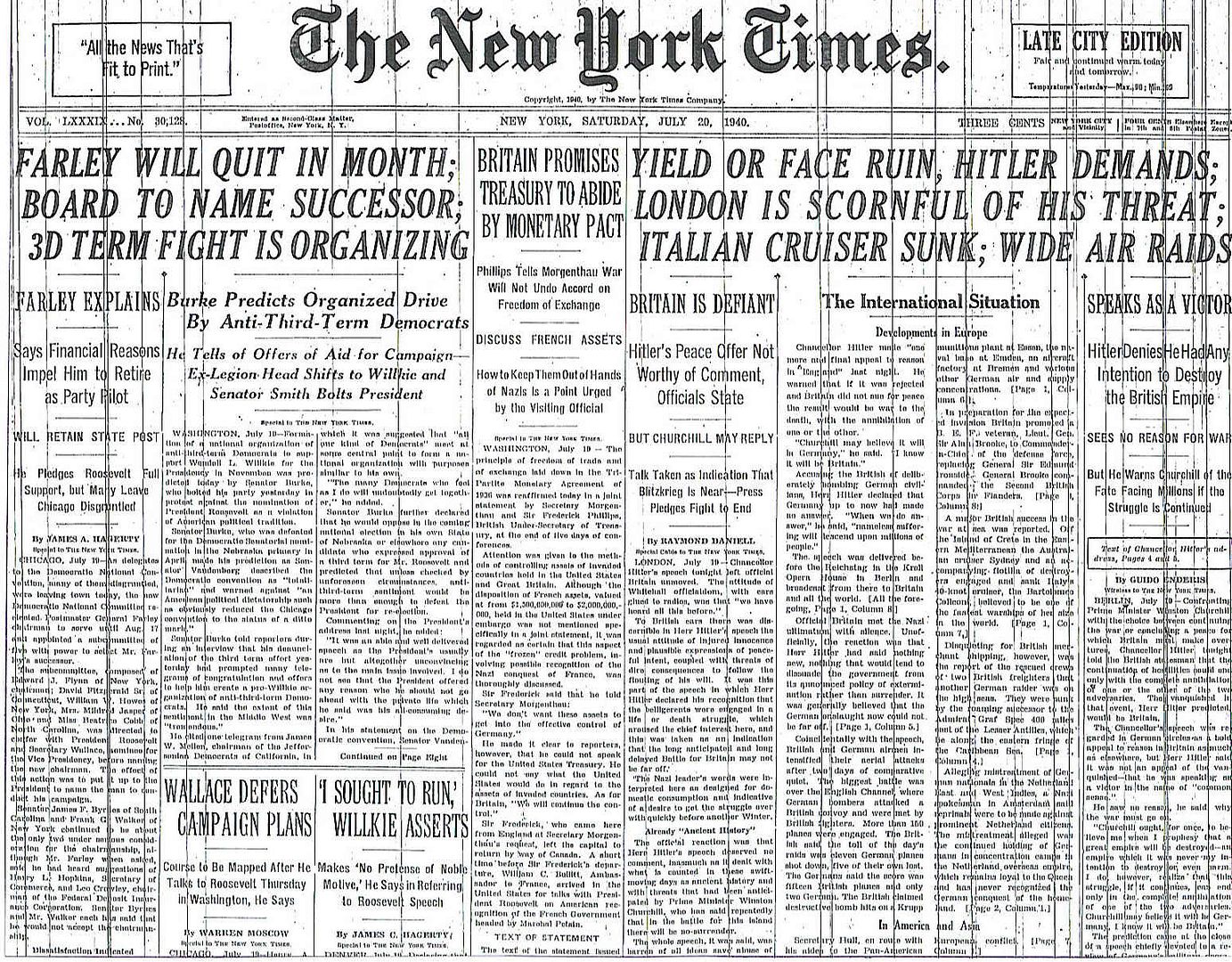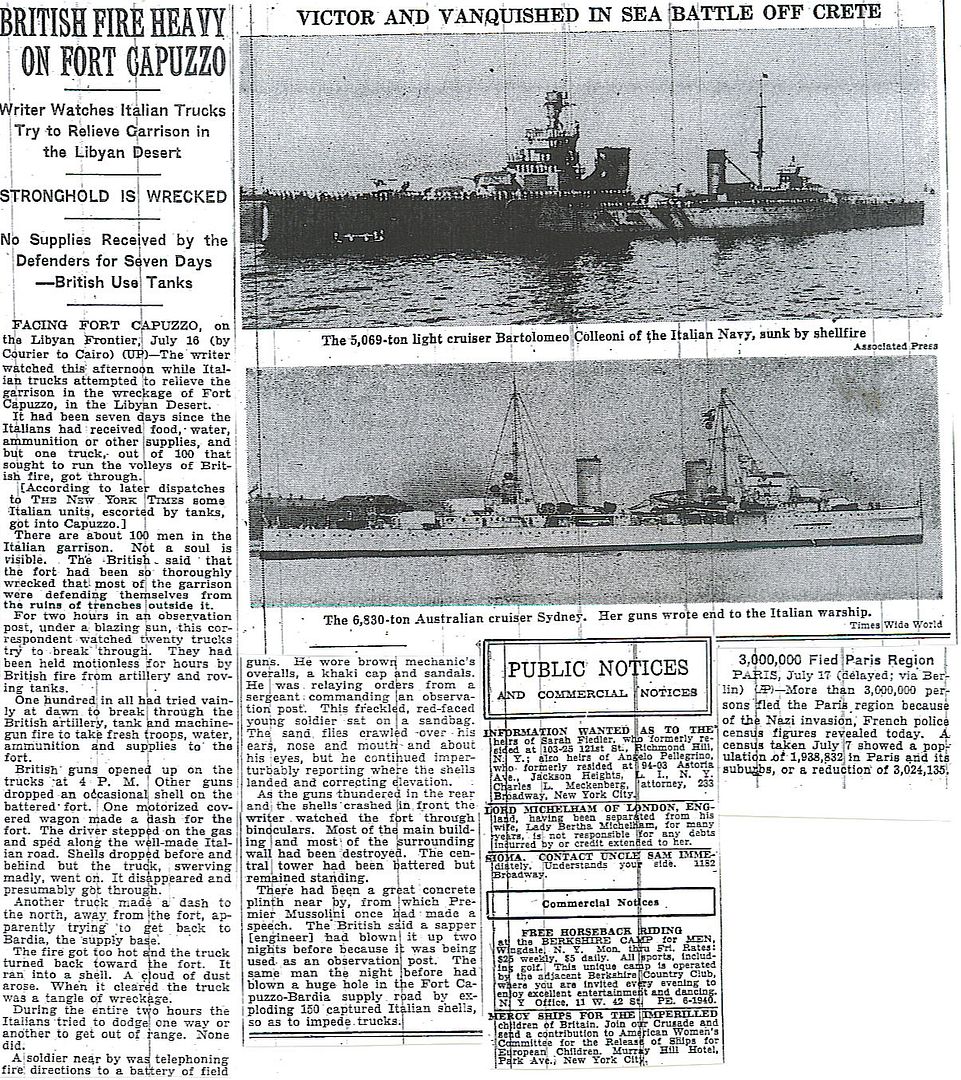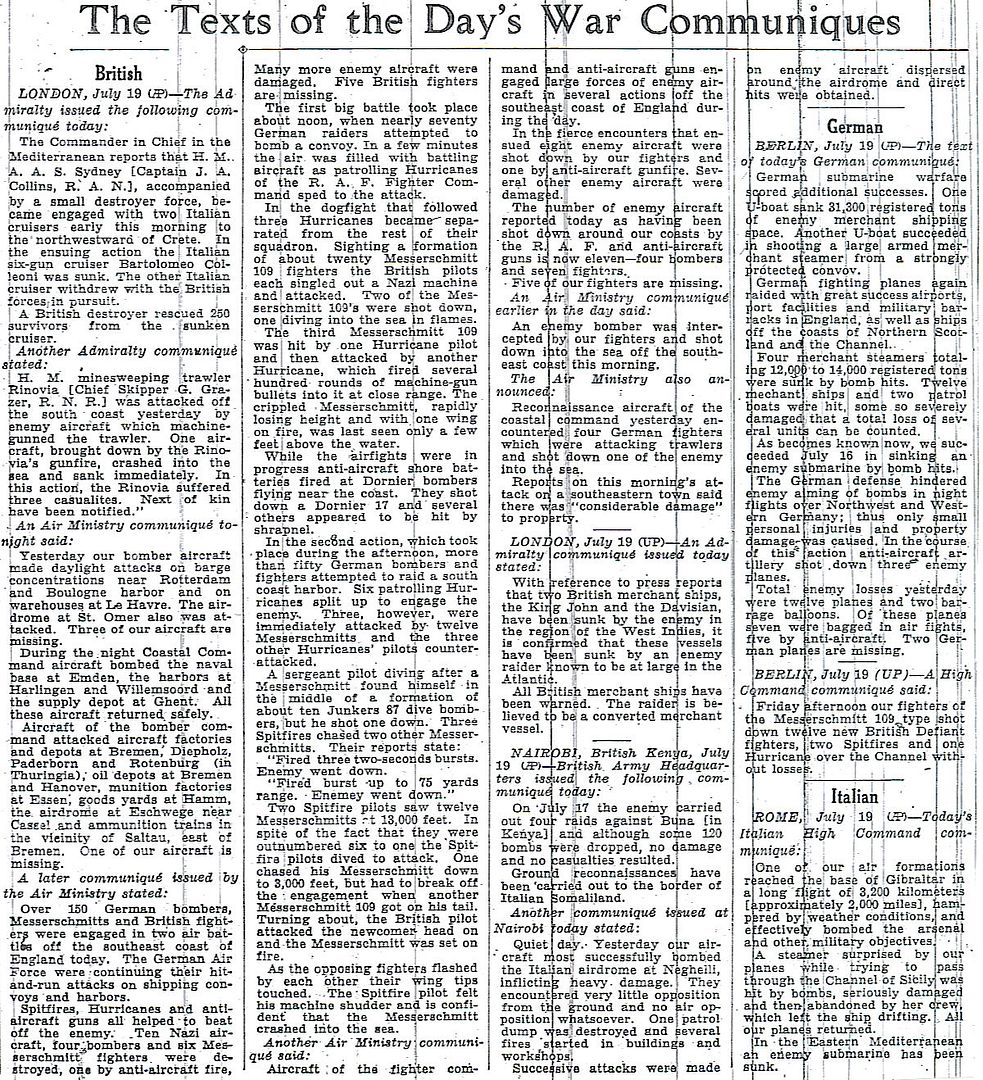
Posted on 07/20/2010 5:27:53 AM PDT by Homer_J_Simpson











http://www.onwar.com/chrono/1940/jul40/f20jul40.htm
German night-fighter achieves kill
Saturday, July 20, 1940 www.onwar.com
An Me110 of NJG 1specially outfitted for night fighting, with its pilot and radio operator prepare for take off.
Over Germany... First Lieutenant Werner Streib in an Me110 night-fighter, using only visual contact, achieves the first nighttime kill of the war by shooting down a British Whitley bomber over northwestern Germany.
In Berlin... Goring, the commander in chief of the Luftwaffe, orders the creation of the first specialized night-fighter wing — Nachtjagdgeschwader 1 (NJG 1) — under the command of Colonel Josef Kammhuber.
In the Mediterranean... Off the coast of Tobruk in Libya, 2 Italian destroyers and a cargo ship are torpedoed by British Swordfish torpedo bombers.
http://homepage.ntlworld.com/andrew.etherington/month/thismonth/20.htm
July 20th, 1940
UNITED KINGDOM: Whilst escorting Channel convoy CW7, Destroyer HMS Brazen is attacked by a large force of German bombers off Dover at 51 01N 01 17E. She is taken in tow, but later sinks. (Alex Gordon)(108)
RAF Bomber Command: 4 Group (Whitley). Bombing - industrial plant at Dusseldorf and Dornier factory at Wismar.
10 Sqn. Nine aircraft to Dusseldorf. Eight bombed. Opposition severe. One hit by flak.
51 Sqn. Three aircraft to Wismar. All bombed. Opposition severe.
58 Sqn. Eight aircraft to Wismar. Six got off, one returned early, four bombed primary, one bombed alternate. Two hit by flak.
78 Sqn. One aircraft to Wismar. Bombed, but hit by flak.
The buying and selling of new cars is banned.
Now that the so-called “phoney war” is over, women all over Britain are expecting to be asked to play a larger part in the war effort - whether they want to or not.
For many, work in a munitions factory, even on a part-time basis, seems out of the question. Caring for children and elderly relatives, just keeping a home together, takes even more time and energy now than in peacetime. There are long queues for essential provisions; little economies around the home to make things last longer and go further all take time. Many are also taking the full responsibility of raising families alone with their husbands away.
The reluctance felt by many women about taking jobs outside the home is reinforced by their men-folk’s disapproval. There have been public outcries over every new opening, however small, for women that the war has created. The Land Girls have been seen as a threat to agricultural training programmes and moral standards, the women pilots of the Air Transport Auxiliary have been accused of taking the jobs not “for the sake of doing something for the country but for the sake of publicity.”
Add these popular beliefs to the very real burdens of caring for a family in war time, and it’s no wonder that many women prefer to remain at home.
Submarine HMS P-612 launched. (Dave Shirlaw)
MEDITERRANEAN SEA: Tobruk: While HMS Eagle is in Alexandria with the main portions of the Mediterranean Fleet, 824 Sqn, FAA was detached to Sidi Barrani Aerodrome to continue operations against Italian shipping. In the late evening of 20 July, six Swordfish I aircraft, carrying torpedoes, departed to attacking shipping known to be in Tobruk harbor, 95 miles away. In a daring attack in the face of heavy anti-aircraft fire they succeeded in torpedoing and sinking the destroyers Nembo and Ostro. (Mark Horan)
Submarine HMS Parthian landed an agent on Crete. (Dave Shirlaw)
CANADA: Patrol vessel HMCS Ambler departed refit Quebec City for Riviere du Loup patrol duties.
Corvette HMCS Trail laid down North Vancouver British Columbia.
Patrol craft HMCS Norsal (ex yacht Norsal) hired from the Powell River Co. Built Vancouver, British Columbia, 168/21, 122.3x19x10.5ft, 10kts, crew 3/17, 1-.303mg. Returned to owners 1945. Renamed 1973 Maui Lu. (Dave Shirlaw)
U.S.A.: “Billboard” magazine publishes its first listing of best-selling single records. Ten tunes are listed. (Jack McKillop)
http://worldwar2daybyday.blogspot.com/
Day 324 July 20, 1940
Battle of Britain Day 11. Enjoying fine flying weather, Germans attack convoys along the South and East coast of England and the East coast of Scotland. Germans bomb a convoy near Dover, sinking Steamer SS Pulborough (trawler Lady Philomena takes off 17 survivors) and badly damaging destroyer HMS Brazen (taken in tow by tug Lady Brassey). Brazen’s anti-aircraft guns claim 3 German aircraft shot down. http://www.uboat.net/allies/warships/ship/4356.html Destroyer HMS Acheron is bombed and damaged by near misses, 10 miles off the Isle of Wight. Acheron will go to Portsmouth for repairs. Another costly day for the RAF losing 5 Hurricanes, 1 Spitfire and 1 Blenheim (7 pilots and 1 gunner killed). Germans lose at least 6 fighters, 2 bombers and a seaplane.
Following Battle of Cape Spada yesterday, 6 Swordfish torpedo bombers from aircraft carrier HMS Eagle at Sidi Barrani, Egypt, seek Italian cruiser Giovanni dalle Bande Nere at the Italian naval base at Tobruk, Libya. Bande Nere is not there so they sink Italian destroyers Ostro & Nembo and steamer Sereno instead. Italy will soon abandon Tobruk as a sea base but guns from the sunken destroyers will be saved and used in the defense of Bardia.
It seems a bit trite now, but it’s an interesting exercise, nevertheless; make a mental picture of the entire world conflagration, and then contemplate the fact that, indeed, at the time, and in the midst of the whole cataclysmic struggle, there was never any guarantee that the allies would win.
What might the world be like if we were all speaking German or Japanese?
Can’t be. When the educrats told us that the Iraq war was taking longer to win than WWII, they insisted that World War II began on December 7th, 1941. That’s more than a year later than this article is dated.
They also omit the detail that the war was ended with two nuclear bomb attacks.
You’d need to learn to speak the local language inside the prison work camps?
Date: 20th July 1940

Enemy action by day
Our fighters were again mainly engaged in the south against enemy formations despatched to attack convoys and shipping in Dover Harbour. These attacks were preceded by reconnaissance flights up to mid-day. Our fighters engaged the enemy, inflicting casualties and turning him away from his objective before serious damage could be done. On several occasions, however, the enemy did not wait to meet our fighters but turned back on sighting them or on hearing our RT.
South and South-West
Several raids were plotted along the south coast during the morning. Fighter patrols were flown over the convoys and two attacks were made on convoys in this area during the afternoon. The enemy were engaged by our fighters on each occasion. 3 Me109s and one seaplane were shot down for certain and 3 Me109s probable. 3 of our aircraft are missing. In addition, one He59 was probably shot down off the Isle of Wight during the afternoon. One raid plotted from Shrewsbury out over the Isle of Wight was reported as a four-engined Dornier.
South-East Coast
At 0900 hours, 4 raids, each consisting of 3+ aircraft approached the Kent coast. Fighters were despatched and the tracks became confused. No combat reports have been received. Just after 1500 hours dive-bombers escorted by Messerschmitts carried out an attack on Dover Harbour. These were intercepted and one Jaguar-ME was shot down for certain and one probable. Pilots of No. 32 Squadron responsible for this success report that they caught up the enemy aircraft in a straight chase at 2-3,000 feet within 12 miles. Our aircraft were flying at full boost at about 300 miles per hour and were not fitted with Rotol Air Screws. The enemy aircraft were camouflaged pale and dark blue and silver. Later in the afternoon 2 raids of 30+ and 20+ approached Dover from Calais but turned back on perceiving our fighters. One, however, made a quick attack on a convoy and was engaged. 2 Me109s were shot down for certain, 3 Me109s and 3 Jaguar-ME's were possible casualties. 3 of our own aircraft were lost.
East Coast
Up to mid-day, several reconnaissance flights were made off the Norfolk coast and one Ju88 was shot down. At about 1315 hours, three raids apparently attacked a convoy but no bombing reports have been received. Fighters were despatched and one Do17 was a probable casualty.
North-East Coast
Only three raids were plotted in this area. One approached Peterhead and turned back on the arrival of our fighters. The remaining two were probably meteorological flights. One was intercepted and a Do17 shot down off Kinnaird's Head.
France
Normal activity in the Cap Gris Nez area was reported during the day.
By night
Very extensive mining operations were carried out by the enemy between 2200 and 0200 hours, and included the areas of the Needles to Land's End - Bristol Channel - Norfolk - Suffolk - Humber, Tees with special concentration upon Harwich and the Thames Estuary. One raid crossed to the Mersey. Some enemy activity took place between the Orkneys and Kinnaird's Head, probably in search of shipping, but no reports of attacks have been received. A few raids came inland and bombs were are reported to have been dropped on Hartlepool, Silloth, Rochford, Eastchurch, Swansea and near Wells, Lechlade and Chatham; but no reports of serious damage have been received. One enemy aircraft is reported shot down 3 miles off Margate.

________________________________________
Statistics
Fighter Command Serviceable Aircraft as at 0900 hours, 20 July 1940
Casualties:
Patrols:
Balloons:
Aerodromes:
Organisation:
Air Intelligence Reports
Home Security Reports
I suspect if we had lost, the Germans and Japanese would not be as kind to us as we were to them.
Interesting about the Swordfish strike on the destroyers. This is a warm-up for the main event of the war as far as the Swordfish biplane is concerned.
No spoilers for FReepers who might not know - just be sure to read Homer’s post on the 11th November.
Another thing they like to harp on about is why American troops are still in Iraq.
My answer is always: "American troops are still in Germany".
And if you consider the Japanese invasions of China, the war started years ago from this date in 1940.
This thing did not start overnight. I know YOU know that, but others might want to think back to around the time of 9/11 s the starting dates. And consider that the US would still be out of the direct war until NEXT December, and then not fully engaged for another six months or so from that date.
Better yet, troops were in Cuba until almost 1908. That was ten years after the SA War.
I love the public notices on P 9. They read like something from a spy novel. I wonder which are legitimate and which are clandestine.
I am curious, and I am not suggesting more work for you—but are there any accounts on line from the Axis point of view from this day to day perspective. It would be interesting to view the day by day from both sides.
Thanks for all of your work on this project. It is a wonderful fifteen minutes of education in the morning.
Enter into the fray Sir Alan Brooke. He will be a real pain in the neck for Marshall and Eisenhower in the time to come. But then again, I wouldn’t expect anything different from an Ulster boy. I wonder how he felt about Churchill’s offer last month to give Ireland the northern counties if they would enter the war against Germany?
I'm sure there are others too that some could debate, these are just the ones off the top of my head.
Disclaimer: Opinions posted on Free Republic are those of the individual posters and do not necessarily represent the opinion of Free Republic or its management. All materials posted herein are protected by copyright law and the exemption for fair use of copyrighted works.